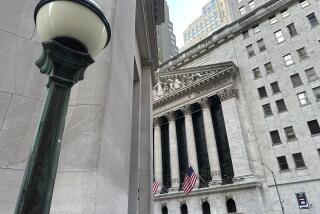Dollar Sinks on Fear of Trade War; Stocks Drop
- Share via
Rising worries about U.S. trade disputes with Europe and China sent the dollar’s value tumbling Tuesday, and Wall Street went with it.
The euro hit its highest level against the greenback in the European currency’s nearly five-year history while the yen rose to a three-year peak.
In the stock market, the Dow Jones industrial average dropped 86.67 points, or 0.9%, to 9,624.16, its seventh loss in eight sessions. The broader market also ended lower, hurt in part by a jump in crude oil prices to levels last seen just after the Iraq war began in mid-March.
The action in currencies and stocks suggested that some investors increasingly feared that trade battles between the U.S. and other countries could escalate, threatening global commerce and economic growth.
For the dollar, there’s a special risk: Because the United States is dependent on foreigners to finance a large chunk of its budget deficit, trade disputes leave the U.S. vulnerable to foreign selling of dollar-denominated securities that could send the buck spiraling lower.
Those concerns may have been magnified Tuesday by a Treasury report showing that foreigners’ purchases of U.S. securities in September exceeded sales by a slim $4.2 billion, down from $49.9 billion in August.
“I see a growing probability of a run on the dollar,” said Paul Kasriel, economist at Northern Trust in Chicago.
A lower dollar is good news for many U.S. companies because it makes American exports cheaper abroad. But it also can make foreign products more expensive for U.S. consumers.
Heavy selling of the dollar Tuesday followed news that the Bush administration planned to limit imports of some textile products from China.
That decision came as the administration faced demands by the European Union to end tariffs imposed last year on steel.
Currency traders and foreign investors may be betting that the administration will risk playing hardball on trade to appease industries in which thousands of jobs have been lost because of imports, some analysts said.
“This is an election year coming up, and employment is going to be an issue,” Kasriel said.
With the dollar already weakened this year, it didn’t take much to push it down Tuesday.
“People have been looking for a very precipitous move in the dollar,” said Craig Larimer, currency strategist at Bank One Capital Markets in Chicago.
The euro zoomed to end the day at $1.195 in New York, up from $1.177 on Monday and the highest value since its creation at the start of 1999.
The dollar also tumbled against the yen, ending at 108.04 yen in New York, its weakest level since November 2000 and down from 108.95 on Monday.
The Bush administration has insisted this year that it favors a “strong” dollar, but it hasn’t intervened as the buck has declined. Many analysts believe the administration has been abetting a weaker dollar to help U.S. manufacturers.
But a sudden collapse of the dollar could cause problems for global financial markets. Foreigners who have been big buyers of U.S. Treasury bonds might dump the securities rather than risk a further devaluation of their holdings. That could drive up U.S. interest rates.
Yet there was no sign of rampant Treasury selling Tuesday. Instead, bond prices rose slightly as some money left stocks for bonds. The yield on the 10-year T-note, which moves in the opposite direction of its price, dipped to 4.14% from 4.20% on Monday.
In the stock market, most indexes were down between 1% and 2% on Tuesday, but volume wasn’t heavy and losers outnumbered winners by a relatively modest ratio of 3 to 2 on the New York Stock Exchange.
The technology-dominated Nasdaq composite was off 27.86 points, or 1.5%, to 1,881.75. The Standard & Poor’s 500 index fell 9.48 points, or 0.9%, to 1,034.15.
Many Wall Street pros believe the chances of an all-out trade war are slim, despite the currency market’s jitters.
Like his recent predecessors, President Bush may for political reasons stage a “tactical retreat” from free-trade policies in some industries, said Jeffrey Applegate, head of investment strategy firm Jeffrey Applegate & Co. in New York. But the broad framework of free-trade agreements negotiated over the last two decades isn’t in danger, Applegate said.
The recent slump in the stock market, he said, probably has more to do with rebounding oil prices than the dollar.
Timothy Morris, chief investment officer at Bessemer Trust in New York, said the dollar might be providing another excuse for stock investors who have been itching to take some money off the table.
“I think people have had a good run and they’re inclined to lock in some profits,” he said.
Although major indexes have fallen seven of the last eight sessions, the decline so far has been a slow-motion affair. The Dow is down 234.30 points, or 2.4%, from its recent peak of 9,858.46 reached Nov. 3. The blue-chip index is up 15.4% year to date.
The Nasdaq index is down 4.8% from its recent peak reached Nov. 6 but still is up 40.9% since Jan. 1.
More to Read
Inside the business of entertainment
The Wide Shot brings you news, analysis and insights on everything from streaming wars to production — and what it all means for the future.
You may occasionally receive promotional content from the Los Angeles Times.










